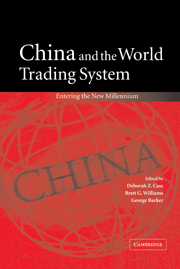Book contents
- Frontmatter
- Contents
- List of figures
- List of tables
- List of contributors
- Preface
- Acknowledgements
- Abbreviations and acronyms
- Introduction: China and the reshaping of the World Trade Organization
- PART I The world trading system
- PART II The accession
- PART III China – the domestic sphere
- PART IV Trade in goods
- PART V Trade in services and competition policy
- 13 WTO membership and professional services regulation in China
- 14 The impact of China's WTO accession upon regulation of the distribution and logistics industries in China
- 15 Regulating the new economy: implications of WTO accession for telecommunications and e-commerce in China
- 16 Segregation and convergence: the Chinese dilemma for financial services sectors
- 17 Adopting a competition law in China
- PART VI Intellectual property
- PART VII Dispute settlement
- Select bibliography
- Index
13 - WTO membership and professional services regulation in China
Published online by Cambridge University Press: 28 July 2009
- Frontmatter
- Contents
- List of figures
- List of tables
- List of contributors
- Preface
- Acknowledgements
- Abbreviations and acronyms
- Introduction: China and the reshaping of the World Trade Organization
- PART I The world trading system
- PART II The accession
- PART III China – the domestic sphere
- PART IV Trade in goods
- PART V Trade in services and competition policy
- 13 WTO membership and professional services regulation in China
- 14 The impact of China's WTO accession upon regulation of the distribution and logistics industries in China
- 15 Regulating the new economy: implications of WTO accession for telecommunications and e-commerce in China
- 16 Segregation and convergence: the Chinese dilemma for financial services sectors
- 17 Adopting a competition law in China
- PART VI Intellectual property
- PART VII Dispute settlement
- Select bibliography
- Index
Summary
In this chapter, China's commitments to liberalization of trade in professional services are assessed against the norms and disciplines of the General Agreement on Trade in Services (GATS) and the regulatory measures that other WTO Member States have maintained. The focus is on the outcome for legal services, making some mention too of accountancy services.
The significance of any liberalization by China depends on the legal resources it will free and, possibly, favour. Consequently, this chapter provides all-too-brief comment on how WTO membership might affect competition between different types of law and styles of ‘lawyering’. China's accession to the WTO may constitute a significant moment in the globalization of law.
The strength of the legal profession in China
Through all the shifts in China's turbulent history, whether the context has been one, say, of Confucianism or communism, law and lawyers have been regarded with some scepticism. During the Cultural Revolution, the government promulgated an edict concerning the abolition of ‘underground lawyers and litigation tricksters’.
The Chinese government now seems prepared to encourage the development of a legal profession. While their ratio to the population is still low, the number of lawyers has been rising rapidly, from some 11,000 in 1979 to 110,000 in 1998. More legal practices are operating independently of state funding as co-operatives or partnerships.Greater devotion to the notion of rule according to law, if not to the rule of law itself, means there are more situations when legal services are productive.
- Type
- Chapter
- Information
- China and the World Trading SystemEntering the New Millennium, pp. 219 - 237Publisher: Cambridge University PressPrint publication year: 2003



